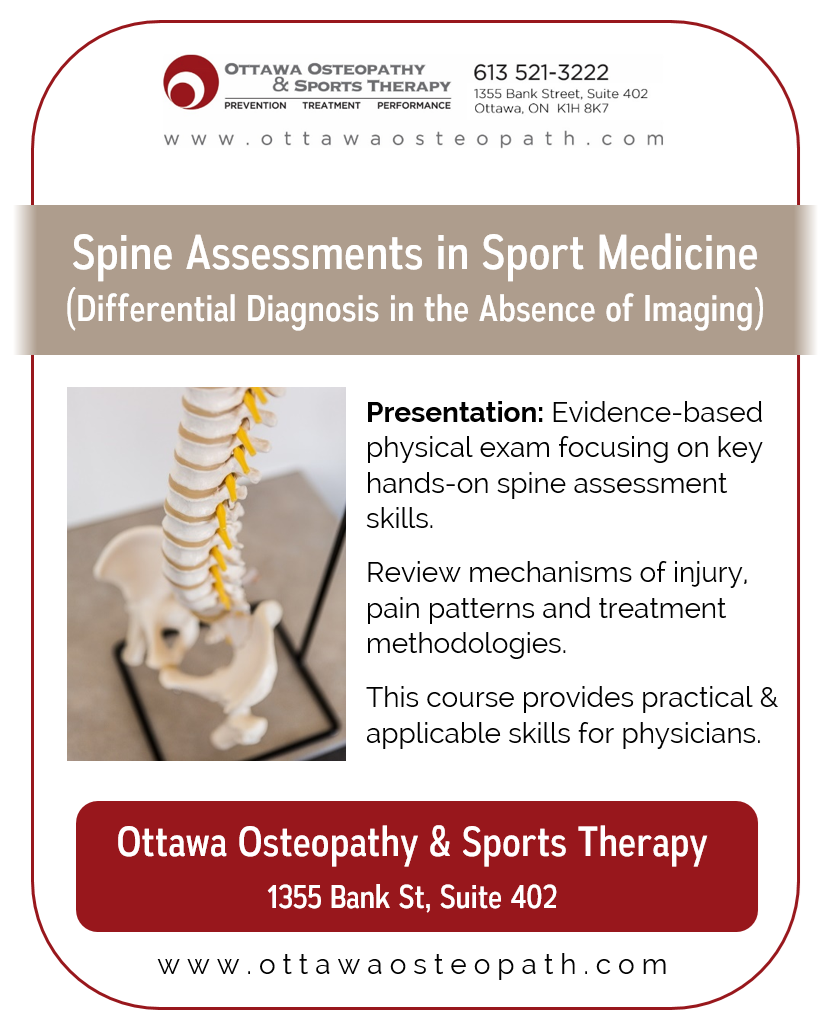(For Physicians and Nurse Practitioners only)
As part of our commitment to providing the most up-to-date evidence-based spine assessments, we are once again offering this continuing education course to the sport medicine fellows completing the University of Ottawa Sport and Exercise Medicine Program. We are opening this up to local physicians in the sport medicine community, primary care physicians and nurse practitioners.
This course is being offered to create a greater understanding of effective spine assessments and best-practice treatment planning. While the focus is a sport medicine setting, the mechanical tests presented will apply to spinal conditions seen in the general population.
There is no fee for this course. This course may be submitted for non-certified Mainpro credits and this course is not sponsored by any pharmaceutical companies or affiliates.
Date:
Friday, July 18th, 2025: 12:00pm - 4:30pm
Location:
1355 Bank St. Suite 402, Ottawa, ON K1H 8K7
Cost:
There is no fee for this course.
 Presenter:
Presenter:
Richard Gregory, CAT(C), D.O.M.P., R.Kin
Certified Athletic Therapist, Osteopathic Manual Practitioner, Registered Kinesiologist. (Read more about the presenter here)
Course Description:
This hands-on presentation will review the relevant anatomy, physiology and pathophysiology of spine conditions (including: disc degeneration, osseous foraminal/canal stenosis, acquired foraminal/canal stenosis, vertebral instability, spondylolisthesis/spondylolysis, intra-discal nerve ingrowth, end plate fracture, etc.) We will review pain types associated with each condition and identify key questions for the history taking. Visual and hands-on presentations will demonstrate the appropriate in-clinic special tests related to each pathology. Discussion of each test will include the relative specificity, reliability and validity as they pertain to the different spine pathologies. There will be time for group practice, questions and case studies. A digital copy of the presentation will be provided along with low cost, evidence-based resources for patient education.
There will be discussion of the limitation of supine conventional vs loaded functional MRI. Participants will learn evidence based assessment protocols to guide treatment planning with or without imaging.
Course Objectives:
Give participants a deeper understanding of the underlying mechanisms of mechanical back pain in sport.
Identify key questions to ask during the history taking.
Learn to quickly recognize dysfunctional spinal curves and movement patterns.
Formulate an index of suspicion/differential diagnosis in a short period of time.
Provide a range of management options for patients including evidence-based self-help books, clinic referral resources and in-person rehabilitation.
Reduce unnecessary imaging requests, emergency room visits, and use of the out-dated term “non-specific low back pain”.
This course registration is full.
To be put on a wait list or attend this course in the future, please email .






